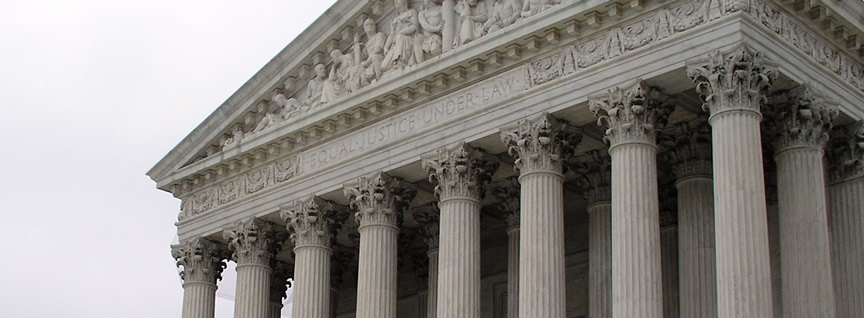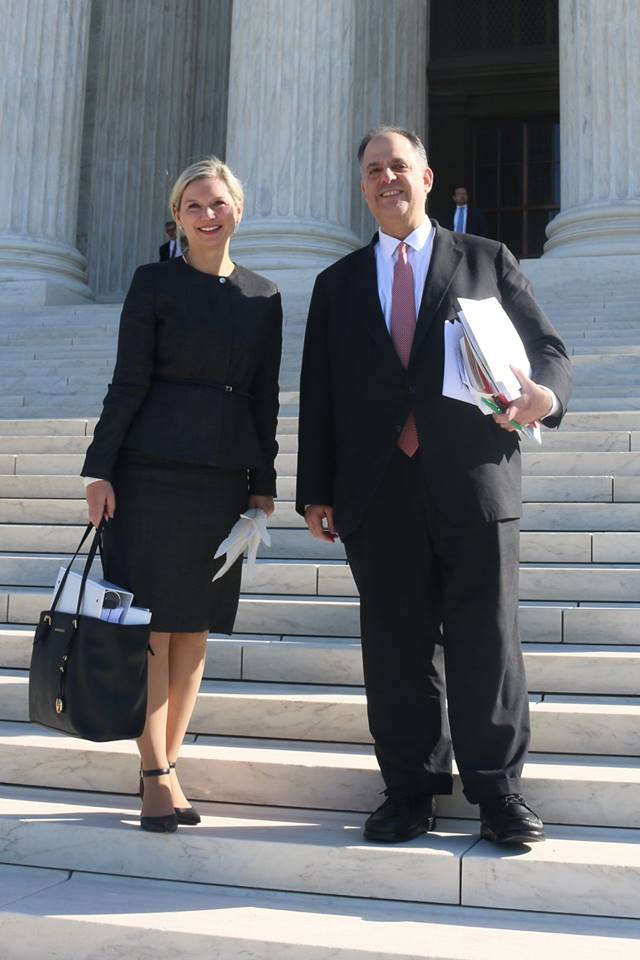
Docket numbers: No. 10-cv-04809-EJD (N.D. Cal.); No. 15-15858 (9th Cir.); No. 17-961 (Supreme Court)
Known at the Supreme Court as Frank v. Gaos, the Center for Class Action Fairness (CCAF) objected to a settlement that provided $0 to class members, but divided $8.5 million between the plaintiffs’ lawyers and cy pres recipients—third party charities selected in part by the alleged wrongdoer, Google. The settling parties in the case (known as In re Google Referrer Header Privacy Litigation in the district court), argued all the way to the Supreme Court that it would be infeasible to pay class members.
The Supreme Court heard the case in 2018, but it did not reach a decision on the underlying practice of cy pres settlements. On March 20, 2019, the Supreme Court issued a per curiam opinion vacating and remanding the case to lower courts to decide the issue of whether plaintiffs even had standing to sue in the first place.
With their settlement vacated, the parties executed a new settlement in 2022. The improved settlement will pay class members—not hand-picked charities—about $17.5 million. The final approval hearing for the new settlement will be heard on October 12, 2023, over nine years after HLLI objected to the original settlement would have paid class members nothing.
Case History: An Illustration of the Problem of Cy Pres Settlements
In the underlying case, plaintiffs sued Google seeking trillions of dollars in statutory damages for alleged federal privacy violations over their search engine. The Center for Class Action Fairness objected to the class action settlement negotiated by the plaintiffs’ lawyers in Gaos v. Google because it provided $0 to class members and $8.5 million to be divided between the plaintiffs’ lawyers—who received $1000/hour on this case—and cy pres recipients.
Under the settlement, the class members who claim harm are entirely ignored, while the class attorneys collect more than $2 million and a handful of third-party organizations—called cy pres recipients—receive over $5 million.
What’s worse is in this case, the cy pres recipients include class counsel’s alma maters and several organizations that Google already supports through donations. This means Google was able to get rid of a lawsuit brought by 100 million class members by making no material changes to its practices and simply donating to many of the same groups it supports anyway. This unfair settlement is a textbook example of cy pres abuse and should be struck down by the court.
Cy pres is an old legal doctrine that roughly translates to “as close as possible,” and it originated in trust law to allow a court to reform a trust or charitable gift that had become impossible to administer according to its terms. More recently, the doctrine has been used by courts to distribute unclaimed dollars in class action settlements to a third-party organization rather than allowing the defendants to keep the funds when those funds cannot be feasibly distributed to the class. Even though these dollars rightfully belong to the class members, oftentimes, the parties claim that it is too difficult to distribute these leftover dollars to class members, usually arguing the class is too large or the award is too small.
Approval of all-cy pres settlements threatens the future of class action recovery. If this type of abuse of cy pres were allowed to stand, it whould encourage more attorneys to structure settlements to benefit their own interests by directing settlement funds to their pet causes instead of their clients’ interests that they have a duty to represent.
The Center for Class Action Fairness has been a pioneer of protecting consumers and shareholders from the abusive practice of cy pres, winning landmark appellate decisions on the question in 2011, 2013, 2014, 2015, and arguably Gaos itself in 2019.
The U.S. District Court for the Northern District of California approved the settlement over CCAF’s objection. CCAF appealed the settlement approval to the Ninth Circuit, and oral argument was heard on March 13, 2017. On August 22, 2017, the Ninth Circuit affirmed the district court’s order approving a cy pres-only settlement.
The Ninth Circuit approved the settlement citing that district courts can approve cy pres in class action settlements as long as the settlement is “fair, adequate, and free from collusion.” On September 5, 2017, CCAF requested a rehearing, but the Ninth Circuit denied the motions on October 5, 2017. CCAF petitioned the U.S. Supreme Court to review the case on January 3, 2018. Justice Roberts had previously expressed interest in addressing cy pres issues in a previous HLLI appeal of a Facebook cy pres settlement, Marek v. Lane.

Frank v. Gaos at the Supreme Court
The Supreme Court agreed to hear the case on April 30, 2018. Eight amici filed in support of CCAF, including the attorneys general of 16 states.
Oral argument occurred on October 31, 2018, and Ted Frank joined the very small group of litigators to have argued his own case before the Supreme Court.
On March 20, 2019, the Supreme Court issued a per curiam opinion vacating and remanding the case to lower courts to decide the issue of whether plaintiffs even had standing to sue in the first place.
Justice Thomas dissented from the remand, opining that standing for the underlying complaint exists. Justice Thomas would have reversed approval of the settlement, finding that the “cy pres-only arrangement failed several requirements of Rule 23” suggesting that counsel did not adequately represent the class and that such settlement was not “‘superior to other available methods for fairly and efficiently adjudicating the controversy’ when it serves only as a vehicle through which to extinguish the absent class members’ claims without providing them any relief.”
The Ninth Circuit remanded the case to the district court for further proceedings, and the Ninth Circuit in turn remanded to the district court.
With the settlement vacated, the parties resumed litigation and the district court denied Google’s motion to dismiss in part on June 5, 2020. On October 6, 2021, the parties advised that an agreement in principle had been reached and requested to stay the litigation pending execution of the settlement, which occurred in 2022. The district court granted preliminary approval of the new settlement in May 2023, and scheduled October 12, 2023 for the final fairness hearing.
On October 16, 2023, the district court granted final approval to the improved settlement. The court found that the CCAF objectors’ “litigation ultimately led to a substantial increased benefit for the Settlement Class as a whole.” The new settlement provided an increased common fund of $23 million, with over $16 million directly distributed to the class – compared to the $0 they would have received under the original $8.5 million all-cy pres settlement.
This case was formerly a project of the Competitive Enterprise Institute and now is being actively litigated by the Hamilton Lincoln Law Institute.
District Court and Ninth Circuit Case Documents
Supreme Court Case Documents
